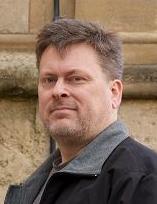fiction.wikisort.org - Writer
Edward C. Feser (/ˈfeɪzər/; born April 16, 1968) is an American traditionalist Catholic philosopher. He is an Associate Professor of Philosophy at Pasadena City College in Pasadena, California.
Edward Feser | |
|---|---|
 | |
| Born | Edward C. Feser April 16, 1968 |
| Alma mater |
|
| Occupation | Philosopher, writer |
| Known for | Neo-scholasticism, religious writings, traditionalist Catholicism, traditionalist conservatism |
| Television | Five Proofs (EWTN, 2018) |
| Website | edwardfeser.com
Philosophy career |
| Era | Contemporary philosophy |
| Region | Western philosophy |
| School | Analytical philosophy, Thomism, Neo-scholasticism, natural law, virtue ethics |
| Institutions | Loyola Marymount University, Pasadena City College |
Main interests | Metaphysics, ethics, natural theology, philosophy of mind, political philosophy |
Influences
| |
Education
Feser holds a Ph.D. in philosophy from the University of California at Santa Barbara, an M.A. in religion from the Claremont Graduate School, and a B.A. in philosophy and religious studies from the California State University at Fullerton. His thesis is titled "Russell, Hayek, and the Mind-Body Problem".[2] He also went to Crespi High School in California.
Career
Feser is an associate professor of philosophy at Pasadena City College and has been a visiting assistant professor of philosophy at Loyola Marymount University and a visiting scholar at Bowling Green State University's Social Philosophy and Policy Center.[3]
Called by National Review "one of the best contemporary writers on philosophy," Feser is the author of On Nozick, Philosophy of Mind, Locke, The Last Superstition: A Refutation of the New Atheism, Aquinas, Scholastic Metaphysics: A Contemporary Introduction, Neo-Scholastic Essay, and Five Proofs of the Existence of God, the co-author of By Man Shall His Blood Be Shed: A Catholic Defense of Capital Punishment, and the editor of The Cambridge Companion to Hayek and Aristotle on Method and Metaphysics. His primary academic research interests are in metaphysics, natural theology, the philosophy of mind, and moral and political philosophy.[4]
Feser writes on politics and culture from a conservative point of view and on religion, from a traditional Roman Catholic perspective. His work has appeared in The American, The American Conservative, Catholic World Report, City Journal, The Claremont Review of Books, Crisis, First Things, Liberty, National Review, New Oxford Review, Nova et Vetera, Public Discourse, Reason, and TCS Daily.[4]
Feser's book The Last Superstition: A Refutation of the New Atheism makes a philosophical argument for the classical Aristotelian-Thomistic worldview over and against the materialist assumptions, which he sees as scientistic prejudices, of contemporary atheists such as Richard Dawkins, of whom he is particularly critical.[5]
Personal life
Feser lives with his wife and six children in Los Angeles, California.[3]
Bibliography
- On Nozick (Thomson-Wadsworth, 2003) ISBN 978-0534252335
- The Cambridge Companion to Hayek (Cambridge University Press, 2006) ISBN 978-0521849777
- Philosophy of Mind (A Beginner's Guide) (Oneworld Publications, 2007) ISBN 978-1851684786
- Locke (Oneworld Publications, 2007) ISBN 978-1851684892
- The Last Superstition: A Refutation of the New Atheism (St. Augustine's Press, 2008) ISBN 978-1587314520
- Aquinas (A Beginner's Guide) (Oneworld Publications, 2009) ISBN 978-1851686902
- Aristotle on Method and Metaphysics (as editor and contributor) (Palgrave Macmillan, 2013) ISBN 978-0230360914
- Scholastic Metaphysics: A Contemporary Introduction (Editiones Scholasticae, 2014) ISBN 978-3868385441
- Neo-Scholastic Essays (St. Augustine's Press, 2015) ISBN 978-1587315589
- By Man Shall His Blood Be Shed: A Catholic Defense of the Death Penalty (with Joseph M. Bessette) (Ignatius Press, 2017) ISBN 978-1621641261
- Five Proofs of the Existence of God (Ignatius Press, 2017) ISBN 978-1621641339
- Aristotle's Revenge: The Metaphysical Foundations of Physical and Biological Science (Editiones Scholasticae, 2019) ISBN 978-3868382006
- All One in Christ: A Catholic Critique of Racism and Critical Race Theory (Ignatius Press, 2022) ISBN 978-1621645801
References
- "Edward Feser: Haldane on Nagel and the Fifth Way". August 2014.
- Russell, Hayek, and the Mind-Body Problem. WorldCat. OCLC 248515504.
- "Edward Feser". Retrieved 28 May 2014.
- "Edward Feser".
- Seaman, Mary McWay (September 2011). "The Last Superstition: A Refutation of the New Atheism". New Oxford Review. Archived from the original on 16 August 2018. Retrieved 2 April 2014.
External links
Другой контент может иметь иную лицензию. Перед использованием материалов сайта WikiSort.org внимательно изучите правила лицензирования конкретных элементов наполнения сайта.
WikiSort.org - проект по пересортировке и дополнению контента Википедии